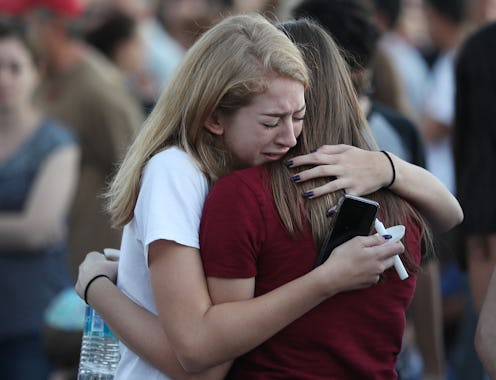News
Russian Bots Had Florida Shooting Opinions & They Spammed Your Twitter Feed With Them

American intelligence agencies have concluded unequivocally that Russia attempted to interfere with the 2016 election, but the Kremlin didn't hang up its shoes once the voting ended. In its continuing efforts to sow discord, Russia sees social media as a key way to hype division. Case in point: following the Parkland shooting, Russian bots saturated Twitter with pro-gun messages designed to stir up partisan rancor.
A successful bot campaign entails a slew of artificial accounts jumping on a hashtag and sharing it as quickly as possible. The goal is to use these bogus accounts to get real Twitter users to pick up and start including these hashtags in their own tweets. This is how the Twitter frenzy behind the hyped up Nunes memo — pushed by the #ReleaseTheMemo hashtag — actually began. These tactics are hardly a secret.
Such tactics seem especially awful in the wake of a tragedy like the mass shooting at Marjory Stoneman Douglas High School, with 17 students and faculty dead, and several more in the hospital with serious injuries. Yet that didn't stop Russian bots from flooding Twitter with mostly pro-gun messaging in the immediate aftermath of the school shooting Wednesday.
"I don’t think the Kremlin cares one way or another whether we enact stricter gun control laws," Bret Schafer told Wired. The research analyst said rather that Russia's goal is to further its own geopolitical interests.
And one of Russia's top geopolitical interests is creating an atmosphere where citizens of democratic countries start doubting everything — their institutions, their politicians, the motivations of their leaders, their media, even the very tenets of democracy itself.
Russian bots pushing pro-gun positions right after children were gunned down at a high school fits that agenda well. As Wired's Eric Griffith details, Hamilton 68 and Botcheck.me — two websites that track activity from bots — both reported a massive sudden surge in terms related to the Parkland shooting shortly after news media began reporting what had happened there.
Trending hashtags included the words Parkland, guncontrolnow, shooting, and Nikolas Cruz, the alleged perpetrator of Wednesday's attack. The words Florida, Nikolas, NRA, shooter, shooting, and teacher topped the list of trending topics among the bots.
And while the hashtag #GunControlNow gained monumental popularity on Twitter, analysts suspect it has nothing to do with a Russian desire to disarm Americans. Instead, it's probably an example of the "Russian strategy of promoting discord on both sides of the debate," writes Griffith.
Americans' awareness of the threat posed by fake social media accounts is almost certainly on the rise. After Facebook was in the news first for supposedly suppressing "conservative" content and later for allowing Russian-backed accounts to buy advertising promoting Trump, Americans on both sides of the political spectrum have had reason to grow warier of social media in general.
But in a debate as raw and heated as gun control, rational debate and moderation can easily go right out the window. For some who believe stricter gun control measures could have prevented the Parkland shooting, a tweet defending regulation-free gun ownership can induce real rage — even if the "person" behind the post doesn't really exist. Twitter as a platform itself thrives on amplifying anger, like other social media networks. And for Second Amendment supporters, the deluge of #GunReformNow tweets can start to feel like an imminent threat, never mind that an untold number of those are from bogus accounts.
It's easy to see how quickly the ante gets upped. The Russian strategy of manufacturing bot rage and counter-rage can be quite effective in furthering partisan divides.